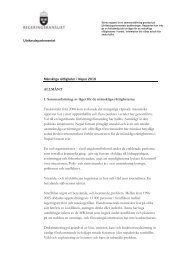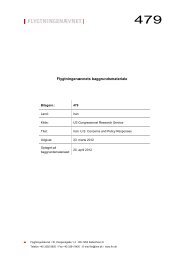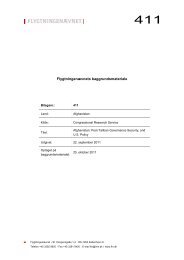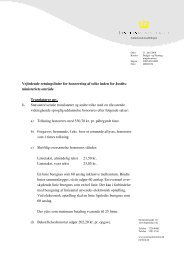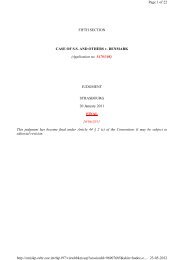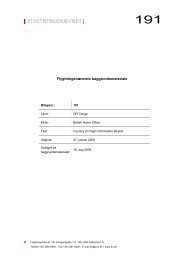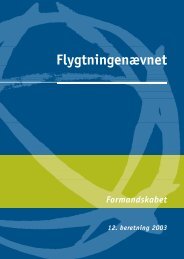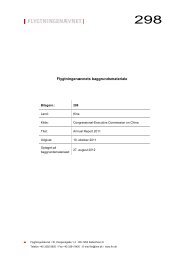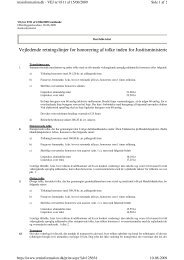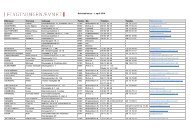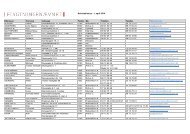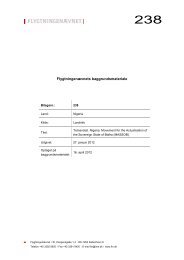Annual Report - National Human Rights Commission
Annual Report - National Human Rights Commission
Annual Report - National Human Rights Commission
Create successful ePaper yourself
Turn your PDF publications into a flip-book with our unique Google optimized e-Paper software.
Summary of Principal Recommendations and Observations<br />
○ ○ ○ ○ ○ ○ ○ ○ ○ ○ ○ ○ ○ ○ ○ ○ ○ ○ ○ ○ ○ ○ ○ ○ ○ ○ ○ ○ ○ ○ ○ ○ ○ ○ ○ ○ ○ ○ ○ ○ ○ ○ ○ ○ ○ ○ ○ ○ ○ ○ ○ ○ ○ ○ ○ ○ ○ ○ ○ ○ ○ ○<br />
○<br />
19.32 In Para 7.42 of the report, the recommendations made by the <strong>Commission</strong> to the<br />
Government of Tripura on 11.8.04, have been detailed. While the ATR received<br />
from the Government of Tripura in December 2004 indicated satisfactory level of compliance<br />
on all points except on the issues of i) strengthening of the <strong>National</strong><br />
Mental Health Programme: and ii) upgradation of Psychiatry Unit, the same are awaited.<br />
The <strong>Commission</strong> would request for compliance with regard to these issues also.<br />
(Para 7.43)<br />
Mental Health<br />
19.33 As mentioned in the preceding reports, the <strong>Commission</strong> had constituted an Expert<br />
Group on 31-12-2001, for rehabilitation of long stay patients who are languishing in the<br />
mental hospitals at Agra, Gwalior and Ranchi even after having been cured of their mental<br />
illness. These patients either do not have families or they have been abandoned by their<br />
families and have nowhere to go. In a meeting of the Expert Group held on 12 July, 2004,<br />
the Directors of the three Institutes gave up to date status of long stay patients with an<br />
account of rehabilitation activities initiated by them with the help of Action Aid India<br />
volunteers. The pendency of two proposals for the establishment of half-way homes, one at<br />
Gwalior and another at Ranchi was pointed out to the representative of the Ministry of<br />
Social Justice and Empowerment. The meeting discussed a proposal of Action Aid India to<br />
set up a <strong>National</strong> Pension Scheme for those mental patients who are fit to be discharged but<br />
whose families are not willing to accept them due to economic constraints. Action Aid India<br />
also suggested formation of a Protective Community Life Scheme for looking after those<br />
cured patients whose families are either not traceable or cannot be trusted for taking their<br />
proper care. The meeting decided that the Ministry of Health and Family Welfare should<br />
first ascertain collect from all the 37 Government Mental Hospitals in the country the number<br />
of long stay patients in their respective hospitals who would be eligible for benefits under<br />
these schemes. (Para 7.52)<br />
Trafficking in Women and Children<br />
Judicial Handbook on Combating Trafficking of Women and Children for<br />
Commercial Sexual Exploitation<br />
19.34 Trafficking in human beings is a complex and global phenomenon having serious<br />
visible and invisible impact on women and children. This inherent complexity necessitates<br />
action at various levels by State actors to prevent and combat trafficking on the basis of a<br />
detailed understanding of the players and mechanisms involved in a particular trafficking<br />
situation. In this context, as reported in this report, the draft Judicial Handbook on<br />
Combating Trafficking of Women and Children for Commercial Sexual Exploitation that<br />
was prepared by NLSIU under the overall guidance of the Focal Point on <strong>Human</strong> <strong>Rights</strong><br />
202<br />
<strong>National</strong> <strong>Human</strong> <strong>Rights</strong> <strong>Commission</strong> <strong>Annual</strong> <strong>Report</strong> - 2004-2005<br />
AR-Chapter-1-19-10-6-06.p65<br />
222<br />
7/17/06, 6:30 PM



